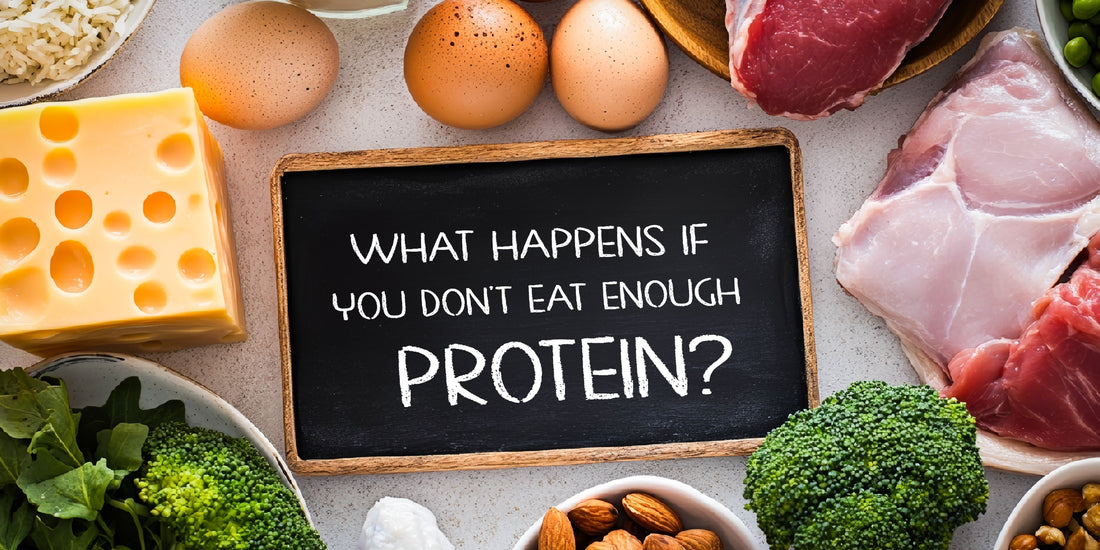
What Happens If You Don’t Eat Enough Protein?
byProtein is a vital food required for muscle repair, strength, and overall bodily function. Athletes and gym-goers require higher protein intake to optimize performance and recovery. But what happens when you don’t get enough protein? A protein deficiency can negatively impact muscle mass, energy levels, immune function, and more.
In this blog, we’ll explore the effects of low protein intake, the signs of protein deficiency, and how to ensure you’re meeting your body’s protein needs.
Effects of Low Protein Intake
1. Muscle Loss and Weakness
Without adequate protein, your body begins to break down muscle tissue for energy, leading to muscle loss, weakness, and reduced athletic performance. This is especially concerning for individuals engaged in strength training or endurance activities.
2. Slow Muscle Recovery & Increased Soreness
Protein is crucial for muscle repair. Insufficient protein intake can lead to prolonged soreness, slower recovery times, and increased risk of injuries after workouts.
3. Weakened Immune System
Protein is vital for producing antibodies and immune cells. Low protein intake can make you more susceptible to infections, colds, and illnesses, hindering your overall health and training progress.
4. Fatigue and Low Energy Levels
Protein helps to keep energy levels stable. A lack of protein can result in constant fatigue, sluggishness, and poor focus during workouts and daily activities.
5. Increased Hunger and Cravings
Protein regulates hunger hormones and keeps you feeling fuller for longer.Not eating enough protein can lead to excessive cravings, overeating, and difficulty managing body composition.
6. Brittle Hair, Skin, and Nails
Protein is an essential component for healthy hair, skin, and nails. A deficiency can cause hair thinning, dry skin, and brittle nails, which are often early warning signs of inadequate protein intake.
How to Ensure You’re Getting Enough Protein
Best Protein Sources:
- Whey & Casein Protein – Fast and slow-digesting proteins for post-workout recovery and overnight muscle repair.
- Lean Meats (Chicken, Turkey, Beef, Fish) – High-quality protein packed with essential amino acids.
- Eggs – A complete protein source with healthy fats for muscle maintenance.
- Plant-Based Proteins (Lentils, Chickpeas, Quinoa, Tofu, Pea Protein) – Ideal for vegetarians and vegans.
- Protein Supplements (Bolt Nutrition Protein Powders) – A convenient way to meet daily protein needs.
Recommended Daily Protein Intake:
- General Fitness & Maintenance: 0.8 – 1.2g per kg of body weight
- The Physical Training: 1.2 - 1.6 grams per kilogram of body weight
- Strength Training & Muscle Gain: 1.6 – 2.2g per kg of body weight
- Post-Workout Recovery: 20-40g of protein within 30-60 minutes after exercise
FAQ – Protein & Your Health
1. How do I know if I’m not eating enough protein?
Common signs include muscle weakness, slow recovery, frequent infections, constant hunger, and brittle hair and nails.
2. Can I obtain adequate protein from plant-based foods?
Yes! Foods like lentils, quinoa, chickpeas, and tofu provide ample protein, but plant-based eaters may need to be more mindful of getting all essential amino acids.
3. What happens if I consume too much protein?
Excessive protein intake is generally safe, but it can lead to digestive discomfort and dehydration. It is critical to balance protein with other macronutrients.
4. Should I take protein supplements?
If you struggle to meet your protein goals through food alone, protein supplements like Bolt Nutrition Protein Powders offer a convenient and effective solution.
5. When is it preferable to ingest protein?
For optimal muscle recovery and growth, spread your protein intake throughout the day, focusing on pre-workout, post-workout, and bedtime meals.
Conclusion
Not getting enough protein can cause muscle loss, lethargy, reduced immunity, and poor recovery. Whether you’re an athlete, bodybuilder, or fitness enthusiast, ensuring adequate protein intake is crucial for peak performance and overall health.
For a reliable and effective way to meet your protein needs, try Bolt Nutrition’s premium protein supplements—designed to optimize muscle growth, recovery, and endurance.











